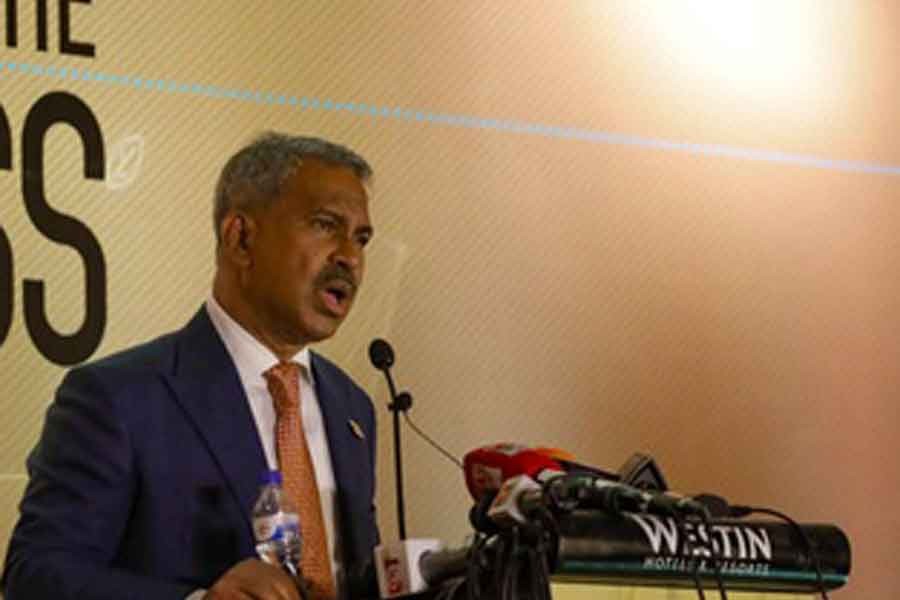The Bangladesh Garment Manufacturers and Exporters Association (BGMEA) is hopeful of obtaining the GSP Plus facilities in the European Union (EU) market after graduation from the Least Developed Countries (LDCs) status of Bangladesh.
"Obtaining GSP Plus status in the EU market will not be difficult if the EU finally adopts the proposed rules without the threshold criteria,” said BGMEA President Faruque Hassan.
The BGMEA president came up with the statement at a press conference on the outcome of his recent visit to the United States and Canada in a city hotel in Dhaka on Saturday, reports BSS.
The EU has proposed to withdraw a stringent 7.4 per cent import threshold in the proposed GSP programme.
The BGMEA president admitted that the GSP facilities in the US market would not be obtained easily as political issues are related here.
He said the EU is the main market of Bangladesh's apparel items as 60 per cent of clothing items go there.
But, following Bangladesh's graduation from LDCs there may be some changes in the market in terms of duty, he said.
The EU plans the adoption of the new GSP scheme for the LDCs and developing countries, for 10 more years between 2024-34 with amendments to the existing rules and regulations by 2023.
The 7.4 per cent threshold is measured for any country under the EU’s import level from any LDC and developing country under its flagship everything but arms (EBA) programme.
The higher threshold for Bangladesh was a major barrier in obtaining the GSP Plus after the LDC graduation.
Currently, some 58 per cent of the total exports and 64 per cent of garment items in particular of the country are destined to the EU.
Bangladesh will be finally graduated as a developing country in 2026 as the country has already fulfilled all three criteria of the United Nations Committee for Development Policy (UNCDP) for graduation.
The BGMEA president said the UN may also allow continuation of duty benefit to the LDCs for 12 years more as the LDCs including Bangladesh have been lobbying with different countries and international communities for extension of the transition period for 12 years.
He said Bangladesh is well ahead of fulfilling the conditions of 32 international conventions for obtaining the GSP Plus to the EU markets.
Currently, Bangladesh has the highest number of Leadership in Energy and Environmental Design (LEED) green factory buildings certified by the United States Green Building Council (USGBC).
Of the top 10 LEED-certified garment buildings, nine are in Bangladesh while of the top 100 such buildings 40 are in the country and 500 more local garment factories are waiting to be certified by the USGBC soon.
Of the total 148 LEED-certified garment factories, some 48 are platinum rated and 91 are gold-rated green factory buildings.
Bangladesh has started receiving an increased volume of work orders from international retailers and brands with the reopening of the global economies from the fallouts of the Covid-19.
He mentioned that prices of the raw materials and freight charges were increased from 100 to 400 per cent.
For this reason, the prices of the exported item also increased, he added.
Despite the price hike of the garment items, the export value of the items to the US markets declined by 8.04 per cent between August last year and July this year because of the fallouts of the Covid-19 in the global apparel supply chain, he noted.
The BGMEA president suggested calculating the prices of per unit garment items and cost of products carefully to avoid losses amid the inflow of increased work orders.
He urged garment manufacturers and exporters to be more careful in price negotiation as the RMG sector has faced cancellation and suspension of work orders worth $3.18 billion last year.
Faruque Hassan said they've now focused on communication, PR and branding to pull the industry ahead globally. "Image-building and branding are now our main focused", he added.
Mentioning that communication is their prime goal now, he said it would help the apparel industry boost sourcing, pricing and order globally.


